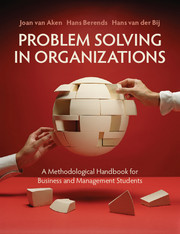Book contents
- Frontmatter
- Contents
- Figures
- Tables
- Boxes
- Preface
- Part I Fundamentals
- Part II The Problem Solving Project
- 6 Intake and orientation
- 7 Theory-informed diagnosis of business problems
- 8 Solution design
- 9 Change plan design and the actual change process
- 10 Evaluation, learning and termination
- Part III Methods
- Part IV Case Material
- References
- Author index
- Index
10 - Evaluation, learning and termination
from Part II - The Problem Solving Project
- Frontmatter
- Contents
- Figures
- Tables
- Boxes
- Preface
- Part I Fundamentals
- Part II The Problem Solving Project
- 6 Intake and orientation
- 7 Theory-informed diagnosis of business problems
- 8 Solution design
- 9 Change plan design and the actual change process
- 10 Evaluation, learning and termination
- Part III Methods
- Part IV Case Material
- References
- Author index
- Index
Summary
Introduction
The final step of the problem solving cycle is evaluation and learning. Evaluation refers to the careful observation and assessment of the process and the effects of an FPS project. An evaluation should tell whether a project is successfully completed, whether improvements need to be implemented and what can be learnt for the future.
Unfortunately, many projects are terminated without an evaluation. For example, von Zedtwitz (2002) finds that 80 per cent of research and development projects are not evaluated. When a project is reaching its finalization, other projects loom ahead, which require attention from the current project members. For the project members, it may be more interesting to dive into a new project than to take a step back and contemplate the current one. However, that is a pity, because evaluation and learning are highly valuable. The evaluation of student projects has an additional limitation in that these projects are often finished before implementation due to their limited timeframe. If they do implement an object design, there is little time left for the effects to be realized and measured. Nevertheless, evaluation and learning are also valuable when implementation effects cannot yet be measured.
Evaluations can be performed with four objectives in mind. First, evaluations serve the current problem solving project by determining the results achieved and the improvements to be made. This is evaluation in a strict sense. In a broader sense, for which we use the term ‘learning’, evaluation serves three further objectives. As a second objective, evaluation may also be oriented towards learning for future problems in the same context. This use of evaluation and learning is particularly stressed in the literature on organizational learning and knowledge management (see, for example, Busby, 1999; and von Zedtwitz, 2002). Third, evaluation and learning can be oriented towards advancing generic scientific knowledge about this type of business process. Finally, evaluation and learning are necessary for personal and professional learning and development.
- Type
- Chapter
- Information
- Problem Solving in OrganizationsA Methodological Handbook for Business and Management Students, pp. 153 - 168Publisher: Cambridge University PressPrint publication year: 2012



